DTGOV Application: Phase-by-Phase Transformation with Microservices
VerifiedAdded on 2023/01/12
|6
|1133
|93
Report
AI Summary
This report provides a comprehensive analysis of the DTGOV travel and accommodation booking application's transformation. It begins by identifying stable and frequently changing modules, as well as those experiencing peak user loads. The report then outlines a phase-by-phase transformation strategy, suggesting the refactoring of the Account Administration and Travel Requirements modules as a starting point. It emphasizes the benefits of adopting a microservices architecture, particularly in terms of high availability and scalability. The report details how microservices can be implemented to optimize the application, including optimizing the application architecture, increasing code efficiency, utilizing programming languages, container deployment, and effective monitoring. The architecture of the microservices is illustrated by the application of features like wish lists and catalogues. The report concludes with a microservices architecture diagram for the DTGOV travel and booking application, illustrating how different services can be broken down and mapped to parent services. The report's analysis is supported by references to relevant research papers.
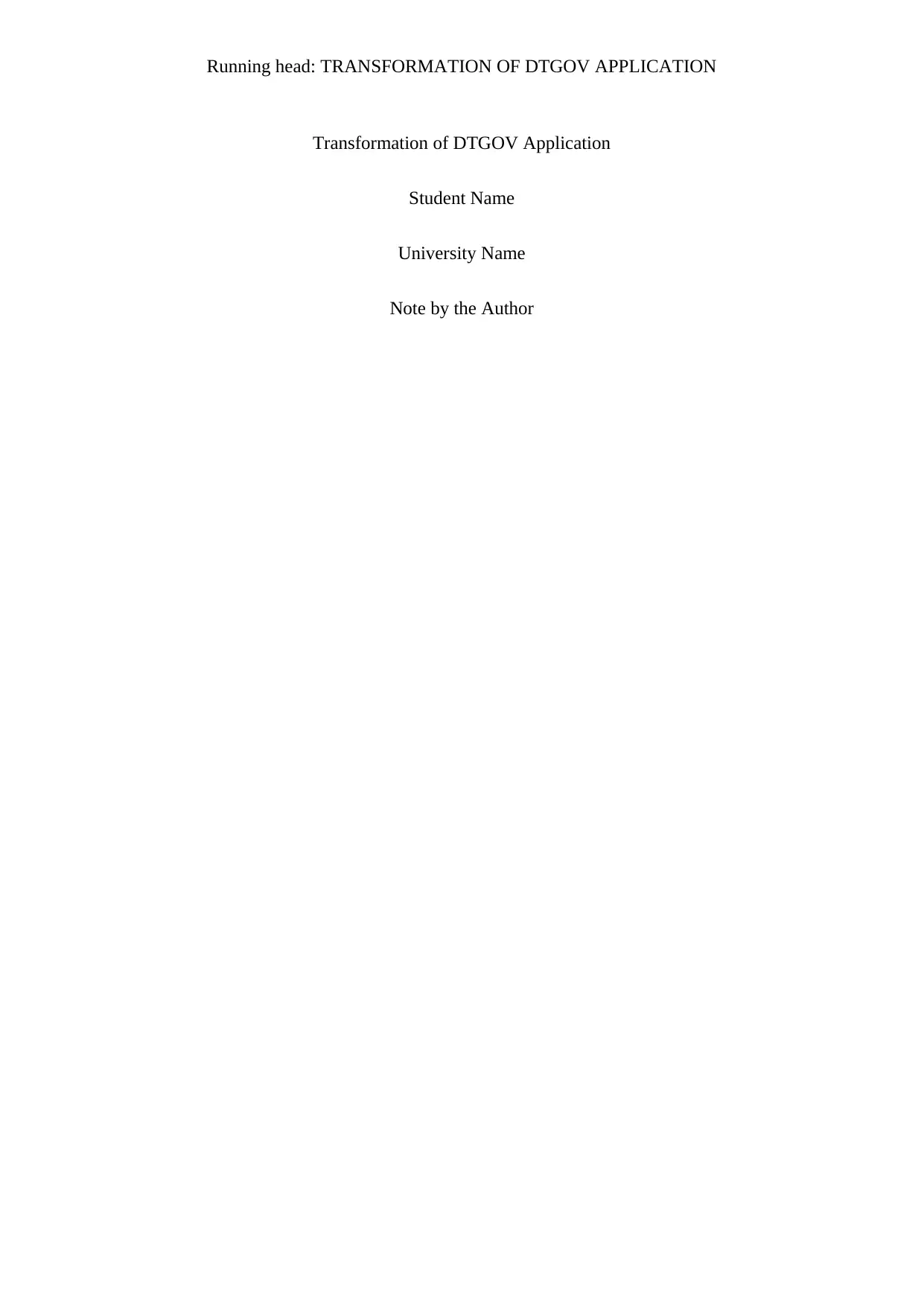
Running head: TRANSFORMATION OF DTGOV APPLICATION
Transformation of DTGOV Application
Student Name
University Name
Note by the Author
Transformation of DTGOV Application
Student Name
University Name
Note by the Author
Paraphrase This Document
Need a fresh take? Get an instant paraphrase of this document with our AI Paraphraser
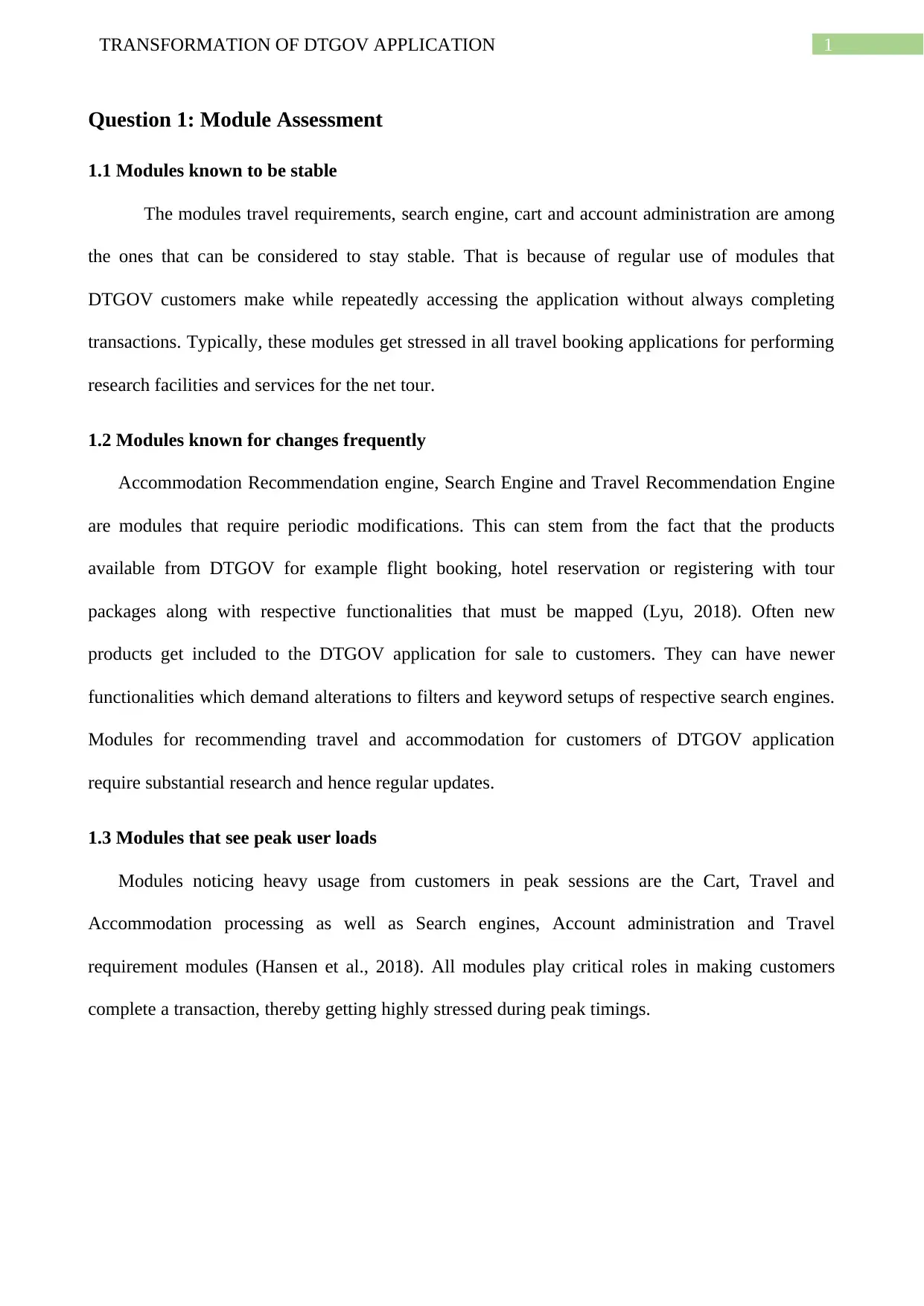
1TRANSFORMATION OF DTGOV APPLICATION
Question 1: Module Assessment
1.1 Modules known to be stable
The modules travel requirements, search engine, cart and account administration are among
the ones that can be considered to stay stable. That is because of regular use of modules that
DTGOV customers make while repeatedly accessing the application without always completing
transactions. Typically, these modules get stressed in all travel booking applications for performing
research facilities and services for the net tour.
1.2 Modules known for changes frequently
Accommodation Recommendation engine, Search Engine and Travel Recommendation Engine
are modules that require periodic modifications. This can stem from the fact that the products
available from DTGOV for example flight booking, hotel reservation or registering with tour
packages along with respective functionalities that must be mapped (Lyu, 2018). Often new
products get included to the DTGOV application for sale to customers. They can have newer
functionalities which demand alterations to filters and keyword setups of respective search engines.
Modules for recommending travel and accommodation for customers of DTGOV application
require substantial research and hence regular updates.
1.3 Modules that see peak user loads
Modules noticing heavy usage from customers in peak sessions are the Cart, Travel and
Accommodation processing as well as Search engines, Account administration and Travel
requirement modules (Hansen et al., 2018). All modules play critical roles in making customers
complete a transaction, thereby getting highly stressed during peak timings.
Question 1: Module Assessment
1.1 Modules known to be stable
The modules travel requirements, search engine, cart and account administration are among
the ones that can be considered to stay stable. That is because of regular use of modules that
DTGOV customers make while repeatedly accessing the application without always completing
transactions. Typically, these modules get stressed in all travel booking applications for performing
research facilities and services for the net tour.
1.2 Modules known for changes frequently
Accommodation Recommendation engine, Search Engine and Travel Recommendation Engine
are modules that require periodic modifications. This can stem from the fact that the products
available from DTGOV for example flight booking, hotel reservation or registering with tour
packages along with respective functionalities that must be mapped (Lyu, 2018). Often new
products get included to the DTGOV application for sale to customers. They can have newer
functionalities which demand alterations to filters and keyword setups of respective search engines.
Modules for recommending travel and accommodation for customers of DTGOV application
require substantial research and hence regular updates.
1.3 Modules that see peak user loads
Modules noticing heavy usage from customers in peak sessions are the Cart, Travel and
Accommodation processing as well as Search engines, Account administration and Travel
requirement modules (Hansen et al., 2018). All modules play critical roles in making customers
complete a transaction, thereby getting highly stressed during peak timings.
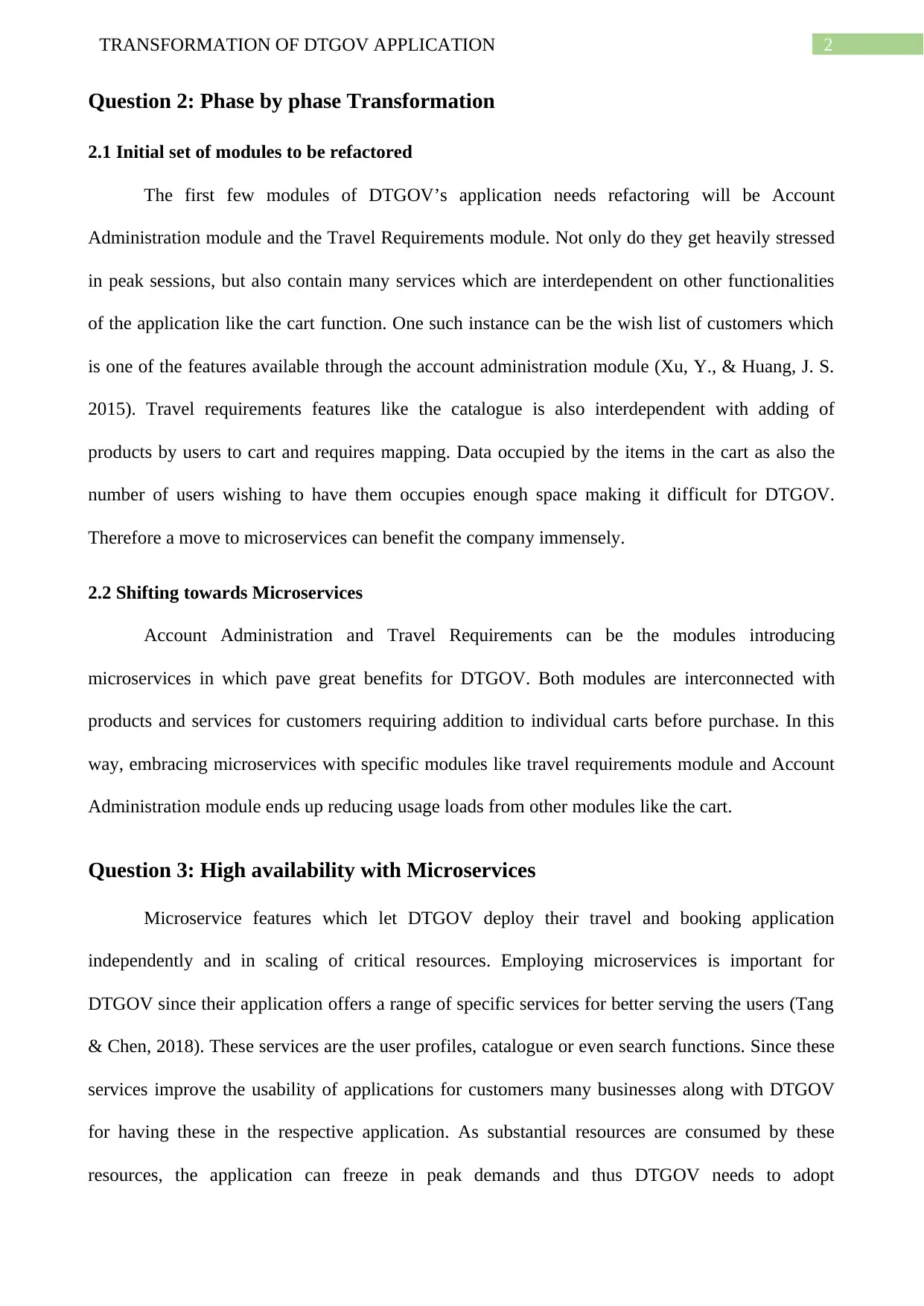
2TRANSFORMATION OF DTGOV APPLICATION
Question 2: Phase by phase Transformation
2.1 Initial set of modules to be refactored
The first few modules of DTGOV’s application needs refactoring will be Account
Administration module and the Travel Requirements module. Not only do they get heavily stressed
in peak sessions, but also contain many services which are interdependent on other functionalities
of the application like the cart function. One such instance can be the wish list of customers which
is one of the features available through the account administration module (Xu, Y., & Huang, J. S.
2015). Travel requirements features like the catalogue is also interdependent with adding of
products by users to cart and requires mapping. Data occupied by the items in the cart as also the
number of users wishing to have them occupies enough space making it difficult for DTGOV.
Therefore a move to microservices can benefit the company immensely.
2.2 Shifting towards Microservices
Account Administration and Travel Requirements can be the modules introducing
microservices in which pave great benefits for DTGOV. Both modules are interconnected with
products and services for customers requiring addition to individual carts before purchase. In this
way, embracing microservices with specific modules like travel requirements module and Account
Administration module ends up reducing usage loads from other modules like the cart.
Question 3: High availability with Microservices
Microservice features which let DTGOV deploy their travel and booking application
independently and in scaling of critical resources. Employing microservices is important for
DTGOV since their application offers a range of specific services for better serving the users (Tang
& Chen, 2018). These services are the user profiles, catalogue or even search functions. Since these
services improve the usability of applications for customers many businesses along with DTGOV
for having these in the respective application. As substantial resources are consumed by these
resources, the application can freeze in peak demands and thus DTGOV needs to adopt
Question 2: Phase by phase Transformation
2.1 Initial set of modules to be refactored
The first few modules of DTGOV’s application needs refactoring will be Account
Administration module and the Travel Requirements module. Not only do they get heavily stressed
in peak sessions, but also contain many services which are interdependent on other functionalities
of the application like the cart function. One such instance can be the wish list of customers which
is one of the features available through the account administration module (Xu, Y., & Huang, J. S.
2015). Travel requirements features like the catalogue is also interdependent with adding of
products by users to cart and requires mapping. Data occupied by the items in the cart as also the
number of users wishing to have them occupies enough space making it difficult for DTGOV.
Therefore a move to microservices can benefit the company immensely.
2.2 Shifting towards Microservices
Account Administration and Travel Requirements can be the modules introducing
microservices in which pave great benefits for DTGOV. Both modules are interconnected with
products and services for customers requiring addition to individual carts before purchase. In this
way, embracing microservices with specific modules like travel requirements module and Account
Administration module ends up reducing usage loads from other modules like the cart.
Question 3: High availability with Microservices
Microservice features which let DTGOV deploy their travel and booking application
independently and in scaling of critical resources. Employing microservices is important for
DTGOV since their application offers a range of specific services for better serving the users (Tang
& Chen, 2018). These services are the user profiles, catalogue or even search functions. Since these
services improve the usability of applications for customers many businesses along with DTGOV
for having these in the respective application. As substantial resources are consumed by these
resources, the application can freeze in peak demands and thus DTGOV needs to adopt
⊘ This is a preview!⊘
Do you want full access?
Subscribe today to unlock all pages.

Trusted by 1+ million students worldwide
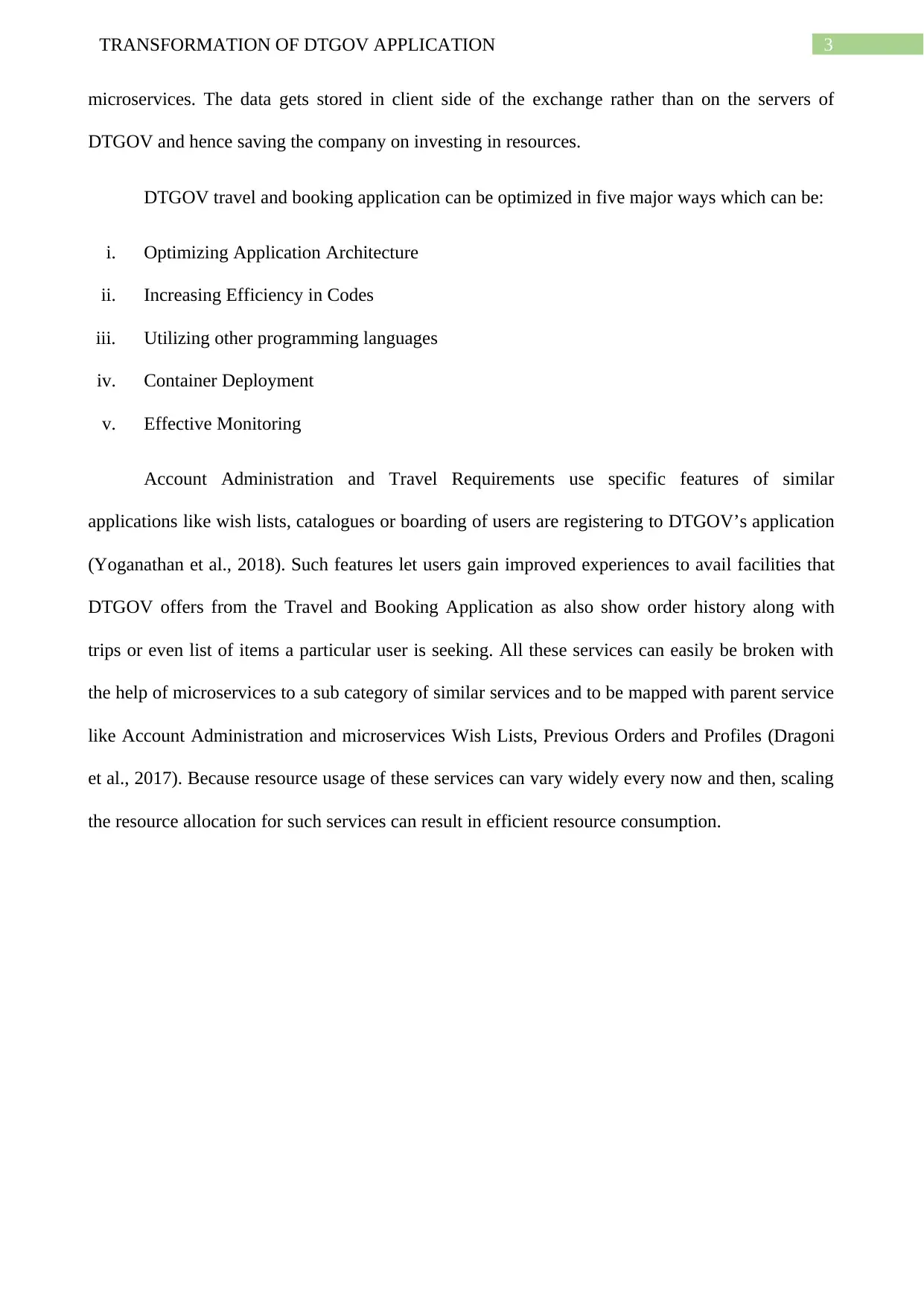
3TRANSFORMATION OF DTGOV APPLICATION
microservices. The data gets stored in client side of the exchange rather than on the servers of
DTGOV and hence saving the company on investing in resources.
DTGOV travel and booking application can be optimized in five major ways which can be:
i. Optimizing Application Architecture
ii. Increasing Efficiency in Codes
iii. Utilizing other programming languages
iv. Container Deployment
v. Effective Monitoring
Account Administration and Travel Requirements use specific features of similar
applications like wish lists, catalogues or boarding of users are registering to DTGOV’s application
(Yoganathan et al., 2018). Such features let users gain improved experiences to avail facilities that
DTGOV offers from the Travel and Booking Application as also show order history along with
trips or even list of items a particular user is seeking. All these services can easily be broken with
the help of microservices to a sub category of similar services and to be mapped with parent service
like Account Administration and microservices Wish Lists, Previous Orders and Profiles (Dragoni
et al., 2017). Because resource usage of these services can vary widely every now and then, scaling
the resource allocation for such services can result in efficient resource consumption.
microservices. The data gets stored in client side of the exchange rather than on the servers of
DTGOV and hence saving the company on investing in resources.
DTGOV travel and booking application can be optimized in five major ways which can be:
i. Optimizing Application Architecture
ii. Increasing Efficiency in Codes
iii. Utilizing other programming languages
iv. Container Deployment
v. Effective Monitoring
Account Administration and Travel Requirements use specific features of similar
applications like wish lists, catalogues or boarding of users are registering to DTGOV’s application
(Yoganathan et al., 2018). Such features let users gain improved experiences to avail facilities that
DTGOV offers from the Travel and Booking Application as also show order history along with
trips or even list of items a particular user is seeking. All these services can easily be broken with
the help of microservices to a sub category of similar services and to be mapped with parent service
like Account Administration and microservices Wish Lists, Previous Orders and Profiles (Dragoni
et al., 2017). Because resource usage of these services can vary widely every now and then, scaling
the resource allocation for such services can result in efficient resource consumption.
Paraphrase This Document
Need a fresh take? Get an instant paraphrase of this document with our AI Paraphraser
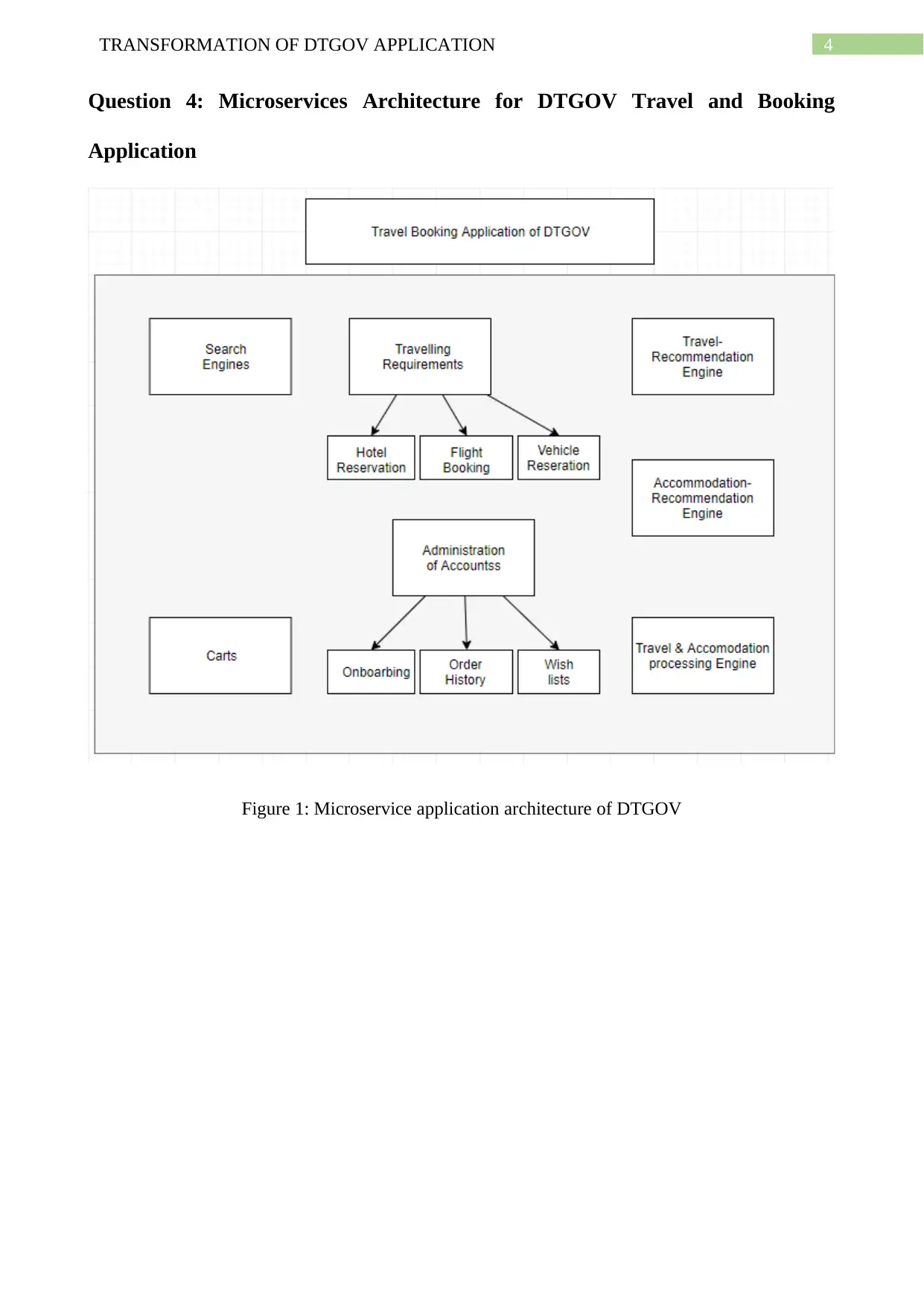
4TRANSFORMATION OF DTGOV APPLICATION
Question 4: Microservices Architecture for DTGOV Travel and Booking
Application
Figure 1: Microservice application architecture of DTGOV
Question 4: Microservices Architecture for DTGOV Travel and Booking
Application
Figure 1: Microservice application architecture of DTGOV
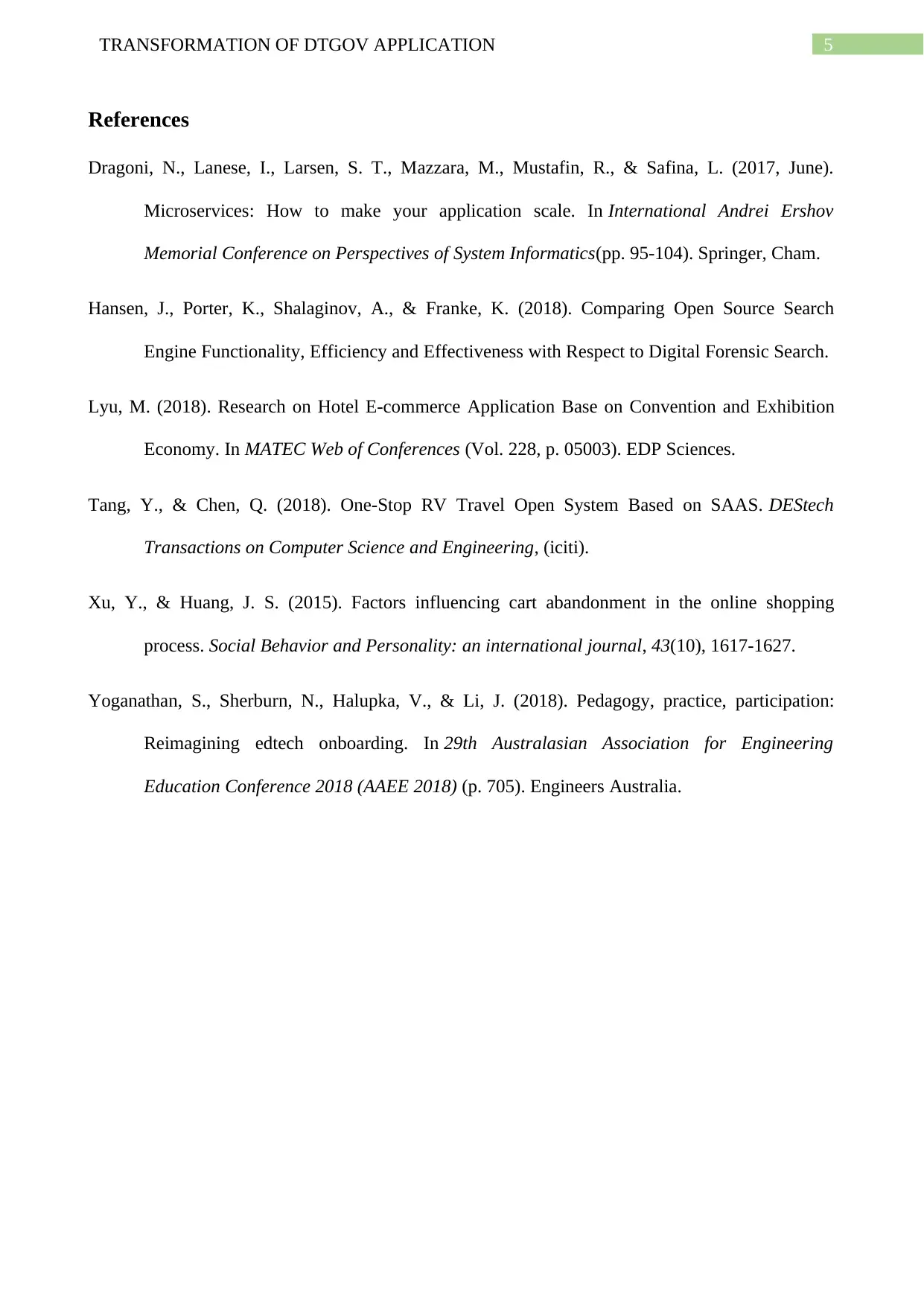
5TRANSFORMATION OF DTGOV APPLICATION
References
Dragoni, N., Lanese, I., Larsen, S. T., Mazzara, M., Mustafin, R., & Safina, L. (2017, June).
Microservices: How to make your application scale. In International Andrei Ershov
Memorial Conference on Perspectives of System Informatics(pp. 95-104). Springer, Cham.
Hansen, J., Porter, K., Shalaginov, A., & Franke, K. (2018). Comparing Open Source Search
Engine Functionality, Efficiency and Effectiveness with Respect to Digital Forensic Search.
Lyu, M. (2018). Research on Hotel E-commerce Application Base on Convention and Exhibition
Economy. In MATEC Web of Conferences (Vol. 228, p. 05003). EDP Sciences.
Tang, Y., & Chen, Q. (2018). One-Stop RV Travel Open System Based on SAAS. DEStech
Transactions on Computer Science and Engineering, (iciti).
Xu, Y., & Huang, J. S. (2015). Factors influencing cart abandonment in the online shopping
process. Social Behavior and Personality: an international journal, 43(10), 1617-1627.
Yoganathan, S., Sherburn, N., Halupka, V., & Li, J. (2018). Pedagogy, practice, participation:
Reimagining edtech onboarding. In 29th Australasian Association for Engineering
Education Conference 2018 (AAEE 2018) (p. 705). Engineers Australia.
References
Dragoni, N., Lanese, I., Larsen, S. T., Mazzara, M., Mustafin, R., & Safina, L. (2017, June).
Microservices: How to make your application scale. In International Andrei Ershov
Memorial Conference on Perspectives of System Informatics(pp. 95-104). Springer, Cham.
Hansen, J., Porter, K., Shalaginov, A., & Franke, K. (2018). Comparing Open Source Search
Engine Functionality, Efficiency and Effectiveness with Respect to Digital Forensic Search.
Lyu, M. (2018). Research on Hotel E-commerce Application Base on Convention and Exhibition
Economy. In MATEC Web of Conferences (Vol. 228, p. 05003). EDP Sciences.
Tang, Y., & Chen, Q. (2018). One-Stop RV Travel Open System Based on SAAS. DEStech
Transactions on Computer Science and Engineering, (iciti).
Xu, Y., & Huang, J. S. (2015). Factors influencing cart abandonment in the online shopping
process. Social Behavior and Personality: an international journal, 43(10), 1617-1627.
Yoganathan, S., Sherburn, N., Halupka, V., & Li, J. (2018). Pedagogy, practice, participation:
Reimagining edtech onboarding. In 29th Australasian Association for Engineering
Education Conference 2018 (AAEE 2018) (p. 705). Engineers Australia.
⊘ This is a preview!⊘
Do you want full access?
Subscribe today to unlock all pages.

Trusted by 1+ million students worldwide
1 out of 6
Related Documents
Your All-in-One AI-Powered Toolkit for Academic Success.
+13062052269
info@desklib.com
Available 24*7 on WhatsApp / Email
![[object Object]](/_next/static/media/star-bottom.7253800d.svg)
Unlock your academic potential
Copyright © 2020–2026 A2Z Services. All Rights Reserved. Developed and managed by ZUCOL.





